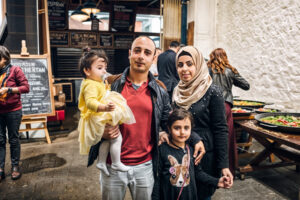“People Living There Needed Help So Badly”
Khaled Naanaa is a surgical and anesthesia nurse from Damascus, Syria who helped set up a clinic in the war-torn town of Madaya. For more than three years, Naanaa treated victims of war. He was in Madaya when the town came under siege and civilians, including kids, began starving to death.
Three small bedrooms and a tiny backyard filled with enough natural light to enjoy every moment of life in peace and safety – this is the place in Perth, Australia where Khaled Naanaa now lives with his wife and two daughters. But even living thousands of kilometers away from Syria, Khaled cannot forget the faces of his dying patients, especially children, and will never stop telling the world how starvation was used as a weapon against civilians in Syria.
Madaya is a small mountainous town in Syria, close to the Lebanese border and located 40 km from the capital, Damascus. In 2015, after the civil war broke out in the country, the opposition-held town of Madaya was besieged by the Syrian army and allied fighters from the Lebanese militia group Hezbollah. 40,000 residents of Madaya had been trapped for months, slowly starving to death. Khaled Naanaa was there to witness that, having moved to Madaya in 2012, when he was only 25.
“I knew that Madaya would be a hellish hell, but I also knew that people living there needed help so badly. And when you are in hell, surrounded by needing angels, the meaning of life changes drastically. You are in a surreal zone of the universe; you nourish from a smile of an injured child and a thank you from a desperate mother or an old person. That’s when hell becomes heaven.” Khaled Naanaa never regretted the choice he had made. Before coming to Madaya, he had been working as a nurse in a major hospital in Damascus where he lived with his wife and little daughter.
Together with a dentistry student Muhammad Darwish and a vet Muhammad Yosuf, Khaled opened the only medical clinic in Madaya. It was set up in an apartment with four spacious bedrooms, a big living room, a kitchen, and two bathrooms. One of the bedrooms served as a staff room, another was turned into an emergency room for female patients. The third one was for post-surgery rehab; the fourth bedroom served as an operating theatre. The lab was set up in the kitchen; X-ray facilities – in one of the bathrooms. The living room, with its six beds, was used for checkups and treatment.
“We had tough surgical cases, amputations resulting from continuous bombings and landmines planted all around the town. In many cases I referred to videos on YouTube without any comprehension of speech.” Khaled performed surgeries by following the instructions found on YouTube step by step. Soon, the nurse became known as “Dr. Khaled” to the residents of Madaya.
The situation in Madaya changed dramatically for the worse when civilians, including babies and elderly, started dying of starvation in front of Khaled’s eyes. The first victim was a three-month-old baby.
“After desperate calls to the Red Cross and the UN for food and medical supplies, I decided to use the social media to deliver a message of despair and misery to the world.” Naanaa posted images of starving children online, and thankfully, the world did pay attention. Within hours, the footage went viral, making it to the top news worldwide and forcing the Syrian government to allow the delivery of desperately needed supplies to Madaya.
Naanaa’s campaign to save thousands of people had worked, but also led to Khaled receiving death threats and being shot twice. He survived, escaping from Madaya. He walked through the minefields for days to get to the Lebanese border. Then, after hiding in Lebanon for eight months, he finally received a visa to go to Australia. He is currently enrolled in an English language school, preparing for the nursing academy.
“The best rewards and gratitude I received was a smile, a handshake, a thank you, and mostly a big hug from patients that I had saved or eased their pain. It felt like winning the world, and it charged my soul with happiness. It made me think that my life was worth living.”
5 years after leaving Madaya, Naanaa continues to tell his story to the world, urging the international organizations to liaise with individuals like him to recognize the real needs of victims of the war and atrocities and to ease human suffering in conflict zones.

